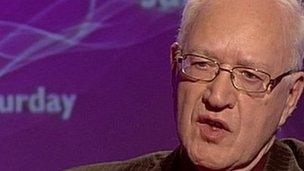Lord Carey warns 'Christianity marginalised'
- Published

Lord Carey said Christians did not 'just leave their faith at the door' when they went to work
Former Archbishop of Canterbury Lord Carey has said the Christian faith is facing "gradual marginalisation".
His warning came after the High Court ruled a council acted unlawfully by allowing prayers at the start of meetings, a ruling which could affect councils across England and Wales.
He told the BBC the ruling was "an empty victory" and councillors could simply pray privately before meetings.
The case had been backed by the National Secular Society.
Lord Carey told BBC Radio 4's Today programme he was concerned people hostile to religion were trying to redefine the public role of religious faith.
In the Devon case, action was brought against Bideford Town Council after an atheist councillor complained about the prayers.
Lord Carey said the issue was "nonsense" and he did not worry too much about the specific case.
"All that needs to be done is for councils up and down the country to say 'we believe prayer is important because in these moments what we are doing is saying something about council work'," he said.
Lord Carey said it was simply a matter of finding a way to accommodate the wishes of councillors, like those in Bideford, who wanted to say prayers.
But he said he had a wider concern about the place of Christianity in society.
Lord Carey believes there is a "gradual marginalisation" of the Christian faith
"This is the gradual marginalisation of the Christian faith, being pushed to the outskirts," he said.
Public faith
He said this was partly due to people misunderstanding the role of the church.
But he also said there was "a deliberate attempt by groups like the National Secular Society and others, who are campaigning to get rid of Christianity as a public faith".
Former Bideford councillor, Clive Bone, an atheist, had argued he faced discrimination and had his human rights infringed by having to be present for prayers during council meetings.
On Friday, the High Court ruled the prayers were not lawful during meetings because they were not inherent to the council's work so the council had no power to hold them as part of its formal agenda.
However, the judge said prayers could be said in a council chamber before meetings as long as councillors were not formally summoned to attend.
Lord Carey continued: "The test of democracy is how we contain disagreements and particularly contain minorities."
He said Christians did not just leave their faith "at the door" when they went to work or were involved in the public sphere and that meant that there could sometimes be confrontation and competition.
He said religious freedom no longer seemed to be a priority.
"Equalities seem to trump all other kinds of freedom," he said.
"This is a time for Christians to stand up and be counted."
'Christian country'
He had earlier written in the Daily Mail, external that the judgement - a test case for England and Wales - could have "incredibly far-reaching consequences".
He called on the government to act and allow local councils to decide for themselves whether they wished to say prayers or not
He wrote: "These legal rulings may also mean army chaplains could no longer serve, and that the Coronation Oath, in which the King or Queen pledges to maintain the laws of God and the lessons contained in the Gospels, would need to be abolished.
"This is a truly terrifying prospect."
Mr Bone said he had taken the action so that people who were not religious would not be put off from applying for public service roles.
Communities secretary Eric Pickles described the ruling as "disappointing" and said Britain "remained a Christian country". He said he would try to bring forward the Localism Act - which gives local authorities more power - in order to reverse the ban on council prayers.
"The new law will be in place this time by next week and the local authorities will be in a position to be able to do what they have always done which is to have prayers before a meeting."
On Saturday the National Secular Society, which had backed the case, tweeted, external: "Secularism seeks to ensure & protect freedom of religious belief & practice for *all* citizens. Challenging privilege is not anti-religious."
On Friday, the society's executive director Keith Porteous Wood called the judgment "an important victory" for those seeking a secular society where they would not be disadvantaged by religion.
- Published10 February 2012
- Published10 February 2012